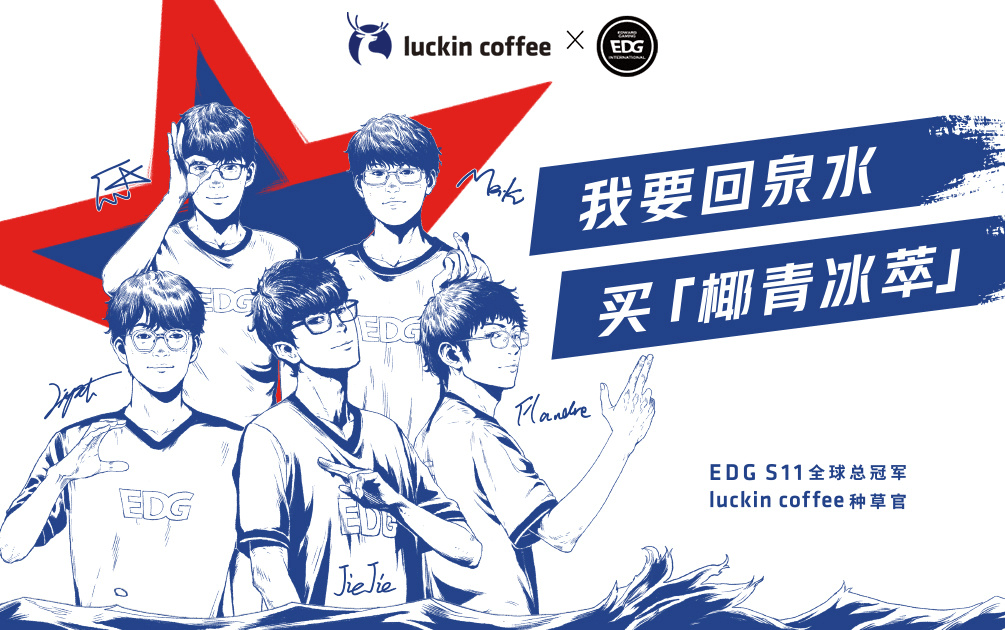Each month, sports digital agency Mailman shares the biggest esports stories and insights from China’s esports scene, along with expert analysis on why they matter.
RELATED: China Esports Blast: March 2022
The COVID-19 lockdown in Shanghai continued to impact China’s esports industry, with no signs of this stopping in May. Many Chinese teams could not attend key international events in person, including Dota 2’s ESL Major in Stockholm and the League of Legends Mid-Season Invitational (MSI). Meanwhile, we saw the cancellation of the Hangzhou Asian Games, delaying esports’ debut as a medal sport. Despite these challenges, there was still positive news last month.
On April 25th, League of Legends World Championship 2021 winner Edward Gaming (EDG) signed a partnership with Luckin Coffee, the China-based rival of Starbucks. Luckin Coffee used the EDG League of Legends team to promote its coffee line, and claimed on Weibo that it would build a co-branded cafe in Shanghai.
Despite the fact that Luckin Coffee has been involved in financial controversy over recent years and has a poor reputation in global markets, the brand is still huge in China. Even if we won’t see the coffee shop open soon in Shanghai due to the strict ongoing COVID-19 lockdown, it’s great to see EDG can still attract high-profile commercial partners from winning the League of Legends World Championship.
Tencent announced on April 7th that it would shut down its live streaming platform Penguin Esports on June 7. Penguin Esports was considered the third largest gaming/esports live streaming platform following DouYu and Huya. Back in 2020, Tencent was planning on letting DouYu acquire Penguin Esports for $500m (~£406m), ahead of the merger between DouYu and Huya.
After the Chinese government forbade the merger between DouYu and Huya, Penguin Esports was placed in an awkward position in Tencent’s live streaming plan. With Huya becoming a subsidiary of Tencent, and Tencent also owning a large share of DouYu and Bilibili, Penguin Esports was always going to become the ultimate loser, with this announcement not surprising anyone.
However, Tencent’s leading position in gaming & esports live streaming platforms is likely to be unaffected.
On April 12, China’s National Press and Publication Administration (NPPA) finally approved 45 gaming licenses, including 39 for mobile games, five for PC games, and one for Nintendo Switch. It’s been eight months since China has approved any games. However, none of the approved games were made by Chinese gaming giants like Tencent and NetEase.
This is a key moment in the gaming and wider esports industry. Since July 2021, no video games had been approved, a sign that the country had started to reconsider the economic value of gaming, as well as its social impact. Riot Games esports title Valorant was not included in this batch of approvals — yet it is still possible for it to be announced later on in the year.
On April 21, NetEase, China’s second-largest game publisher, announced its annual esports plan for Naraka Bladepoint. The Naraka Bladepoint Pro League (NBPL) features 24 franchising slots and ?5.2M RMB (~£632K) in prize money. The 20 regular teams include Weibo Gaming, Jing Dong Gaming, Wolverhampton Wanderers (Wolves), and Swedish esports team Alliance, among others.
It is interesting to see a new franchise esports league established in China, especially outside of Tencent’s control. This is NetEase’s second franchise league, following the Identity V League (IVL). We expect this new league to welcome more international brands as sponsors, joining Durex and electronics brand Philips as previous sponsors of the Naraka Bladepoint World Championship in January.
Mailman is a leading sports digital agency in China. It helps sports organisations & brands to build sustainable businesses in China, one of the world’s most challenging markets. Mailman is an Endeavor China company.
ESI DC is 16-18th May! Find out more.

![Te contamos cuánto cuesta comprar una PC Gamer en Argentina [Diciembre 2025]](https://axxess.ar/wp-content/uploads/2025/12/wp-header-logo-135-218x150.png)


![Te contamos cuánto cuesta comprar una PC Gamer en Argentina [Diciembre 2025]](https://axxess.ar/wp-content/uploads/2025/12/wp-header-logo-135-100x70.png)







